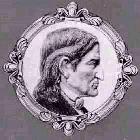
Friedrich Froebel
Born in the village of Oberweissbach, nestled in the lush Thuringian Forest of Germany's heartland.


|
Friedrich FroebelBorn in the village of Oberweissbach, nestled in the lush Thuringian Forest of Germany's heartland. |

|
Gallery shop
|
Friedrich Wilhelm August Froebel welcomed life in 1782. The youngest of a number of brothers, his own mother died while he was still very young. His father, Johannes Froebel, was the Lutheran pastor of the important Oberweissbach parish which had built a beautiful baroque church to welcome communicants from the nearby villages. Oberweissbach was then and is today well known throughout Germany and Europe for its herbal bitters, extracts, and remedies made from plants found throughout the thick surrounding forests. Perhaps because of its botanical heritage, the village became the place where Froebel would begin to feel a deep, mystical connection with Nature, which influenced him for his entire life. He studied mineralogy in Jena and directed the stone and gem collection of Berlin's Humboldt University. He was unswerving in his conviction that all creatures and Nature were inexplicably, yet completely and spiritually connected. This became the basis of his philosophy of Universaler Einklang, or Universal Harmony. Having taken up the education of the sons of his deceased brother, Friedrich marveled at the auto-didactic nature of their play. Each was different, yet each led himself to new understandings and discoveries through individual role playing and adventures. Perhaps the prevailing idea that children should be "seen and not heard" was not correct. Perhaps children carried in them the seed of self-development, which should be encouraged, guided and nurtured by adults. "Kommt, lasst uns unsern Kindern leben" Come, let us live with our children became the cornerstone for a new approach to early childhood education. Children are like the tiny flowers; they are varied and need care, but each is beautiful alone and glorious when seen in the community of peers. "My school shall be called Kindergarten - the garden of children," he reasoned. Froebel's ideas seem correct enough to us today, yet were radical in his day. Children were thought to be tiny replicas of adults. Portraits of the day illustrate it. However, the intervention of Baroness (Freiherrin) Bertha von Marenholtz-Buelow was a blessing that would assist Froebel even well after he died in 1852. Through her connections to the more liberal Weimar court and Thuringian nobility, as well as liberal urban educators and intellectuals in Dresden, Leipzig, Frankfurt and Berlin, Madame von Marenholtz-Buelow convinced skeptics and adherents alike that there was worth in his ideas. Copyright © 1997 - 2008 by The Froebel Gallery. All rights reserved. |